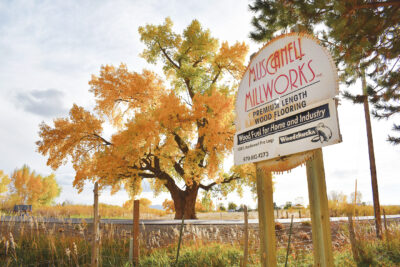
Guest Writer
By Richard Lipman
Guest Writer
Noted an SPF manufacturer in Quebec, “Both Ontario and Quebec are still very difficult. Now that the weather is improving in Ontario, we’re starting to see a little bit more activity there, but in Quebec, it’s still very slow and that’s a function of probably the economy as well. The lumber markets are much stronger in the US right now. They’re about to turn around, to the positive, finally.
Typically what would happen is our market areas would follow, but Canada is in worse shape economically than the US. I’m not sure how much it’s going to step up. We anticipate that most of the sales and the growth, the price increases in the market, will come from the US sales at this point in time”.
An Ontario producer reported that “regarding various grades, there’s nothing that’s lagging at the moment.
Everything is moving well, so that is a positive. We are not necessarily concerned about the countervailing duty announcement, but it changes the strategy a little bit. In the mill’s mind, since the taxes will increase in August, again, they might as well hold off a bit. Most mills in Canada are losing money, a lot of money, so what we need to do is make sure that we get the best value possible for our production.”
A Quebec wholesaler suggested that “mills might try to limit their sales somewhat right now and try maybe to increase the volume of production a little bit closer to the springtime, meaning March and April and May, and closer to the duty change as well in August. This will be done to ensure that they track some better pricing, which is going to happen with the duties that are coming in the fall.
An Ontario wholesaler felt that “what’s going to happen with all the mills before that date in August is that whatever isn’t sold is going to be moved in the US ahead of the tax hike. It is going be moved in reloads and yards and so on, to be able to offset the potential costs, the additional costs in a very difficult market in terms of profits for the mills right now.”
According to a Quebec manufacturer, “I would say that with the production decreases in SPF, especially on the Canadian side, with influence from the west and east, there’s a bit better balance in the marketplace and as the year goes on, and the fact that it’s a US election year as well, I think there’s going to be less barriers to business. I think they’ll want to control interest rates in the US better.
Maybe not that they’re going to decrease, because it’s probably dangerous to do that now, inflation is not yet under control, but they’re going to want to make sure that they create opportunity for everybody for houses. There’s a deficit in housing in the US as it is in Canada and they’ll want to address that if they can. So I think we’re going to have a very good year, and the lumber markets are going to be good and the lumber mills are going be quite happy at the end of 2024. A lot more happy than they were at the end of last year, that’s for sure.”
“In the Pine business,” noted an Ontario producer, “it’s been a quiet winter. There has been a lot of excess White Pine being sawn, as the hardwood market is in the tank. A lot of those mills have taken on some White Pine and Red Pine. Overall, I still think that a lot of the market woes are interest-rate related. It’s finally filtered down and taken hold. But, if the government would drop the rate a couple of times, it would, put some confidence back out there again.”
A Quebec wholesaler figured “with some hardwood mills sawing more Pine, there’s more lumber on the market. There could be more low-end White Pine in the pipeline this year than in other years. I’m not sure just how that’s going to play out with inventories down the road. In general though, we are thinking with some optimism that the markets will open up, maybe in the middle of the month, or the end of March and things will start to get going again.”
“In my opinion,” according to an Ontario wholesaler, “we need a lot more demand, like over the COVID years, because during the pandemic was when people were looking for things to do. We are pretty much at pre-pandemic levels right now, other than the market slope.”
An Ontario producer said, “There’s some pushback on some items on the retail end, price wise. But we’re maintaining our prices. We’re not dropping ours. We’re not getting any relief at our end, so we’re kind of in a bit of a spot anyway. Interest rates are still the big unknown, holding them steady for longer, or even dropping them, will make for a more certain environment that will give people some hope.”
“I don’t know, it could be kind of a funny year perhaps,” noted a Quebec wholesaler. “When we start seeing some interest rate drops happening, people will get a little more confident about the marketplace. Maybe they’ll start doing some projects and get things back to normal again, but it’s been kind of stalled for the last four months approximately, I’d say. It’s not like there’s nothing moving. It’s just that you’re certainly not moving any volume.
According to a Quebec wholesaler, “The countervailing duties announcement does impact the Pine market, at least to some respect. There’s not a lot of manufacturers that export to their market. Unless they’re a bordering mill, where there is sometimes a trade-off, they’ll exchange logs for finished product. They kind of get around that. There’s really very few up in our region that export to the US. The duty announcement is kind of a non-issue, that is how I tend to think of it.”
“I think things will probably get better in the last two quarters of the year,” noted a Quebec producer. “Looking ahead, I think we’re kind of in a zone right now where it’s wait and see. Things will obviously pick up a little bit as we come into the spring, but I don’t think it’s going to be the typical spring that we normally see. But, I would say that a lot of it has to do with the interest rates out there. If we can get a couple of rate cuts going, it will change the dynamics for sure.”
“The weather has certainly been on people’s minds,” said an Ontario mill. “They are still logging but it’s been an unusually warm winter. Usually things are frozen up pretty good, but there’s not a lot of frost in the ground. We are in good shape and a lot of the guys in our area are still okay. But as of late, maybe this past week, with the warmer temperatures, the guys will run the roads in the morning, but then stay off them in the afternoon. They’d be breaking them up.”
Noted an Ontario wholesaler, “It’s really been mild. We’ve only had a couple of cold days all winter, so it’s been strange. It hasn’t been below minus 10 for quite some time. The long and the short of it, I think it’s probably going to be an early breakup and those that are logging are going to probably try to wrap things up a little sooner than later.
Usually the half loads come on at the start of March, so they try to have everything at least to where they don’t have to travel half loads. They forward the material to a point so that at least they can get it out. But towards the end of February, they’re definitely going to be winding it down this year.”









